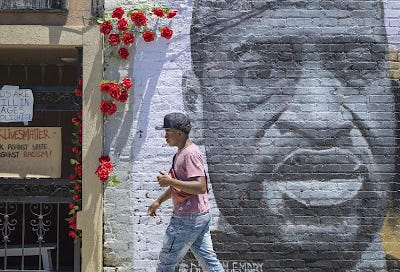Why Not Reparations?
by C.A. Matthews
In my continuing series honoring Black History Month this week I'm tackling another issue that is little understood and is mostly ignored by the mainstream of (white) American society, the topic of reparations. What are reparations and what good will they do if they ever come about? I learned US history from same poorly written/edited textbooks as the vast majority of American students. I confess that I knew next to nothing about reparations until I joined the Green Party.
The Green Party is the only American political party that addresses reparations in their party platform. Here's what they have to say:
The development of the United States has been marked by conflict over questions of race. Our nation was formed only after Native Americans were displaced. The institution of slavery had as its underpinnings the belief in white supremacy, which we as Greens condemn. In slavery's aftermath, people of color have borne the brunt of violence and discrimination. The Green Party unequivocally condemns these evils, which continue to be a social problem of paramount significance.
a. The community of people of African ancestry whose family members were held in chattel slavery in what is now the United States of America have legitimate claims to reparations including monetary compensation for centuries of human rights violations, including the Transatlantic slave trade now recognized by the United Nations as a "crime against humanity." As our Nation has done in the past with respect to the Choctaw, the Lakota, the Lambuth, and more recently for Japanese Americans and the European Jewish community, reparations are now due to address the debt still owed to descendants of enslaved Africans.
b. We commit to full and complete reparations to the African American community of this nation for the past four hundred plus years of genocide, slavery, land-loss, destruction of original identity and the stark disparities which haunt the present evidenced in unemployment statistics, substandard and inadequate education, higher levels of mortality including infant and maternal mortality and the practice of mass incarceration. We recognize that reparations are a debt (not charity) that is owed by our own and other nations and by the corporate institutions chartered under our laws to a collective of people. We believe that the leadership on the question of what our nation owes to this process of right ought to come from the African American community, whose right to self-determination and autonomy to chart the path to healing we fully recognize.
c. We understand that until significant steps are taken to reverse the ongoing abuses; to end the criminalization of the Black and Brown communities, to eradicate poverty, to invest in education, health care and the restoration and protection of human rights, that it will be impossible to repair the continuing damage wrought by the ideology of white supremacy which permeates the governing institutions of our nation.
d. While consensus is still evolving on what would constitute full and complete reparations, we support the following initial steps:
o We support the creation of a claim of action and a right to recover inherited wealth and other profits accumulated from the slave trade for the benefit of a reparations trust fund.
o We will initiate the repeal of the slave clauses that survive today in the U.S. Constitution.
o We will work to restore lands stolen through a variety of tactics including: violence, terrorism and the discriminatory access to operating capital that together has robbed black farmers and the broader community of their lands.
o We support the release of all political prisoners held by the USA. It is time that the political frame-ups, the prosecutorial misconduct and the racist application of police power that pass for justice in our country be buried and those victimized by these abuses of state power be given their lives back.
o We will support existing Historically Black Colleges and Universities, as well as new and existing Education and Development Funds.e. We support efforts to overcome the effects of over 200 years of racial discrimination.
f. We call for an end to official support for any remaining symbols of slavery and specifically call for the removal of the Confederate battle flag from all government buildings.
g. We condemn the practice of racial profiling by law enforcement agencies, which are guilty of stopping motorists, harassing individuals, or using unwarranted violence against suspects with no other justification than race or ethnic background.
h. We favor strong measures to combat official racism in the forms of police brutality directed against people of color.
i. We support effective enforcement of the Voting Rights Act, including language access to voting.
j. We oppose discriminatory English-only pressure groups. We call for a national language policy that would encourage all citizens to be fluent in at least two languages.
k. We strongly support the vigorous enforcement of civil-rights laws, the aggressive prosecution of hate crimes, and the strengthening of legal services for the poor.
This platform plank paints a very concise picture of what reparations would entail when a Green majority is elected to high office. I agree wholeheartedly with it. I also think that the Green Party platform plank on instituting single-payer universal health care for all would go a long way to help make up for past and present discrimination against African Americans and other minorities as well.
So the question in 2022 is, "Why not reparations?" What has been holding Americans back from at least attempting to make amends to the descendants of enslaved peoples? Of course, the most common answers the majority of Americans will give is that reparations aren't economically feasible and that they would give an unfair advantage to one group over another.
In simpler terms: "We enjoy our white privilege too much. We are afraid what could happen to us if we had to admit that we've acted as racist opportunists for far too long and had to pay back all that we stole."
I think that answer is the very reason why reparations are desperately needed. Like the South African reconciliation project achieved after the fall of the apartheid state, Americans need to enter into a process in which we can heal from our collective past sins. We need to make a clean breast of things so life can improve for all human beings on the planet. Ignoring or trying to forget the crimes of the past doesn't aid corporate healing. Old wounds are still festering in this country, and young lives are at stake every time a cop enacts a "no-knock warrant" and takes another innocent African American life.
It's long past time to make amends and end the hate and violence. We must talk seriously about reparations instead of tip-toeing around the subject. Americans can't keep bleeding out what remains of our goodwill and hope things will get better. We won't endure as a nation or as a people for much longer if we don't start to make reparations now.
Related links:
First in the series, What's It Like to be 3/5 of a Person? https://bernie2016.blogspot.com/2022/02/whats-it-like-to-be-35-of-person.html
https://www.gp.org/tags/reparations
https://www.gp.org/social_justice#Reparations
https://www.gp.org/single_payer
https://scheerpost.com/2022/02/14/voting-rights-remain-the-critical-barrier-to-racial-equality/
How a bank robbed former slaves:
***
Say No to War with Russia!
photos by C.A. Matthews
The peace demonstration returns...
The honks were plentiful.
The demonstrators stood tall in the cold and snow.
And they were proud to say "Give peace a chance."
***








